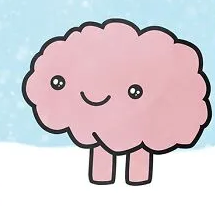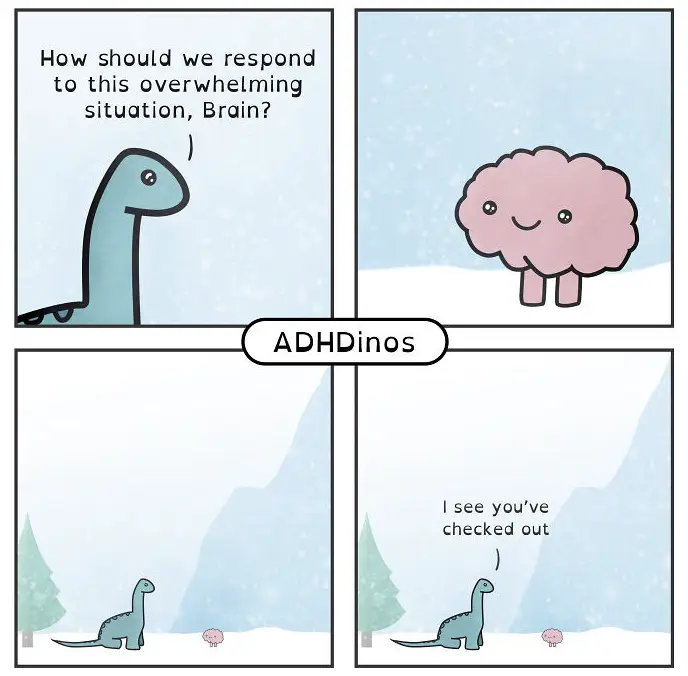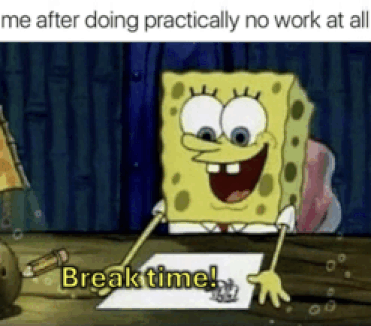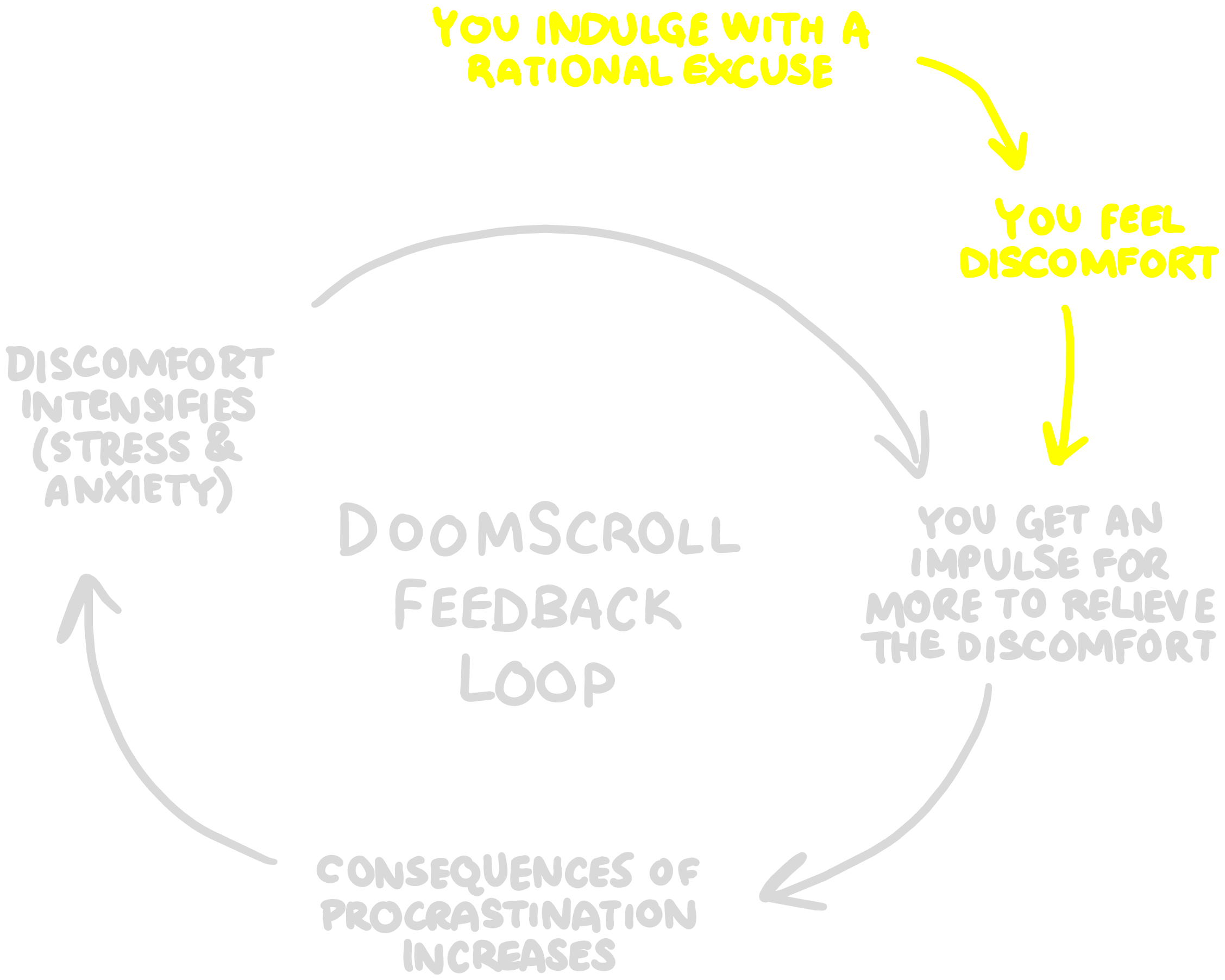Read this if you keep breaking your own promises and want to understand the compulsions and rationalizations that sabotage your ability to stay disciplined.
Let's talk about your brain—about the pile of udon noodles kept safe and cozy in a Tupperware container of a skull.

Sure, it evolved over millions of years to be sophisticated enough to solve a Rubik’s cube (some of us, anyway), but all that newer evolutionary goodness was just tacked on top of a primitive, highly emotional, and reward-driven core.
And that core, or what's often referred to in pop psychology as the Reptilian Brain¹, is, well… it's a bit of an idiot.

Your Reptilian Brain still thinks it’s 72,000 BC. It still thinks we’re all somewhere in the wild where food is extremely scarce and threats are coming at us from every angle. So, it reacts—by secreting chemicals like dopamine, cortisol, and adrenaline—to prod and cajole you to take quick, decisive actions; actions it assumes are essential for survival.
But it’s blind to the outside world.
The only way it knows if an action is survival-related is if it’s given you a big, satisfying reward. And when it senses that kind of opportunity (what's referred to as a “cue”), it compels you to act fast, treating it as life-or-death.
But with the rise of vices—those artificial shortcuts to rewards—that assumption is now completely wrong. And there’s no way to explain that to your primitive brain. So, it keeps pushing you into those actions, no matter how much you (the conscious part) want to stop.
-+-+-
Let's use an example.
Imagine spotting a bowl of gummy bears at a party.

Because you’ve had rewarding experiences with these before, your primitive core immediately reacts:
“Hey! It’s summer! Berries are in! Go, go, go! Eat as many as you can before they’re gone!”
You’re then made to saunter over on auto-pilot and begin picking at the gummy bears, stopping just shy of what's socially unacceptable.
This isn’t some flaw in design. Your brain’s hardwired to push you to eat more than you need — to store extra sugar in fat cells. This helped our ancestors survive cold, long, berryless winters when food was scarce.
But your subconscious doesn't know we live in an age of abundant, sugary foods. It hasn’t evolved a stop instinct. There’s no voice saying, “Okay, enough berries. You don't want diabetes, do you?”
The same goes for social media, porn, TV, and video games. Your brain’s primitive core doesn’t understand what a phone is. It doesn’t recognize the experiences they portray as vicarious and fake. And it certainly doesn't realize they lead to survival detriments rather than benefits—to VIDD symptoms and its consequences.
All it knows is that the shiny, rectangular slab delivers endless bursts of survival-affirming rewards. So it compels you to pick it up and consume, which feels good—or at least relieves discomfort—reinforcing its mistaken assumptions.
"OMG! Look! We're now partying at a club with hot and popular people?!
We did it! We connected with high-status people, which is great for survival!
And how did we end up here?
That's right… we just held up a chunk of metal and glass and moved our thumb a few times. That took like zero effort and risk.
So do it more! Do it again! And again! And again!
WTF, why are you telling yourself to stop!?"

Like I said. The Reptilian Brain. Dummy Extraordinaire.
Vice and conscious rationalization
Your subconscious has a major influence on much of your behavior. It gets you to act on autopilot and with zero thinking. These mental shortcuts have helped our ancestors survive for tens of thousands of years.
But you do still have a conscious mind. You still have free will and the ability to direct and control your actions and make value-driven choices. You can use self-control to override any irrational impulses, and willpower to "ride-out" any discomfort that follows.
But here's the thing: your conscious mind—the part of the brain that plans, weighs out pros and cons, and seems to come to rational choices—is still connected to the Reptilian Brain.
It gets manipulated from the inside out. The deeper, emotional parts of your brain have wiry tentacles that extend out into the newer, “rational” parts of your brain, altering how you think, feel, remember, and reason. Not unlike a parasite, it tricks you, making you think that it’s “you” calling the shots, when really it’s your core biological subconscious hellbent on maximizing rewards while minimizing energy expenditures.
This manipulation is why you find yourself sauntering over to your most despised vices, all casual and nonchalant… as if they haven’t been ruining your life… as if you didn't, 5 minutes earlier, make an ardent promise to avoid them like the plague.
“Lemme just check what’s new on YouTube real quick. Get it out my system. It’ll help me focus.”

“Again?! I'm such an idiot… I knew this would happen! What the heck was I thinking?!”
Well, your thinking was manipulated. Something deep in your brain, below your consciousness, biased, tainted, and twisted your rational thoughts to the point where it felt like a great idea. And once it felt right, you rationalized it, giving yourself the perfect excuse to indulge.
Hot Cognition
You—the real you that can observe, analyze, and arrive at future-oriented decisions—isn't defective or damaged. You're being manipulated and driven by a deeper, more primitive part of your brain that operates on outdated and flawed programming. It simply believes—erroneously—that vices are necessary for survival because they offer the quickest routes to rewards.
To disregard vices means the risk of death. Simple as that.
This all leads to two things:
- The auto-generation of subconscious compulsions towards vices.
- The auto-generation of conscious rationalizations towards vices.
And it's the combination of these that has you floating towards your vices without any hesitation or uncertainty, without any of the "should I, or shouldn't I?" type of contemplation that could lead to more sensible choices. The action just happens, and it feels right and rational.
Psychologists have a term for this emotional process. They call it Hot Cognition. Here's a summary of what this entails:
Hot cognition is used to describe cognitive processes—thoughts, decisions, and perceptions—that are profoundly influenced by emotional states. It manifests through the instinctual drives that compel us toward immediate gratification via vices. Hot Cognition not only has us bypass more deliberative reasoning; it also tactfully manufactures rationalizations that feel logically sound. Consequently, we act with a sense of justification, ensuring our indulgences are swift and easy.
The problem occurs when Hot Cognition leads to actions that you know, on a conscious level, are actually detrimental. This causes an internal conflict as you perceive yourself acting against your own values and best interests. This leads to feelings of guilt, regret, stress, and self-directed anger. And it's those bad feelings that kick off and then fuel the vicious Doomscroll Feedback Loop.

And that's a really big problem.
Footnote
1 - The term 'Reptilian brain' refers to a concept from the Triune Brain Theory proposed by Paul D. MacLean in the 1960s. It was used to describe the brain's most ancient layer, the basal ganglia, which was believed responsible for primal instincts such as aggression and survival mechanisms.
Modern neuroscience has, of course, evolved beyond this simplistic model. In this context, the continued use of 'Reptilian Brain' serves as a metaphor for the various parts and pathways that lead to our instinctual and reward-driven nature, rather than a singular region of the brain.
